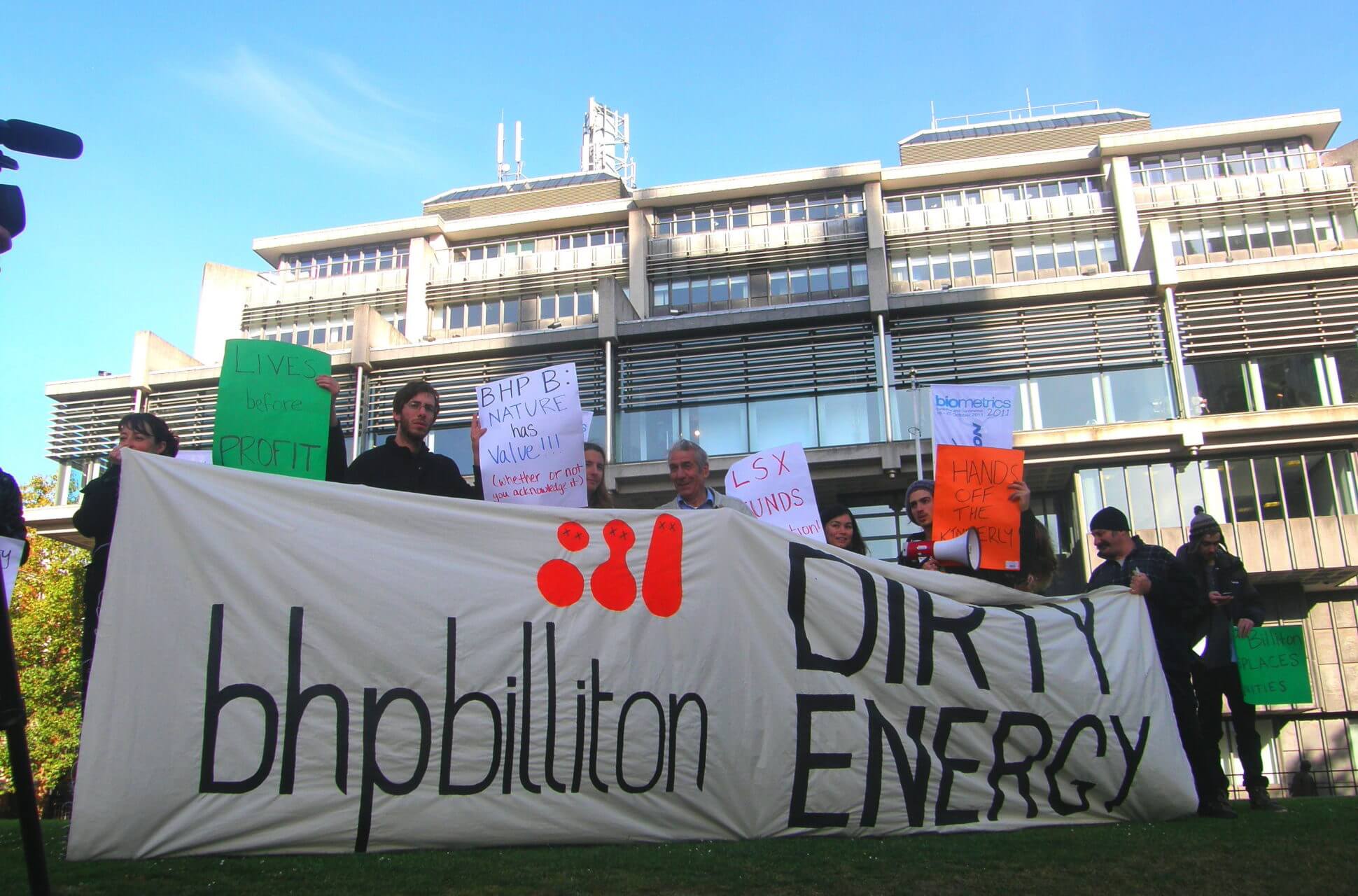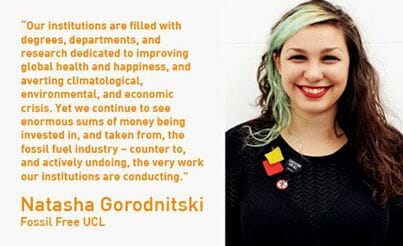
Last week we took part in an interesting afternoon of discussion at UCL called Rich Seams or Dark Pools? Fossil Fuel Funding and Research. The event was following in the wake of an internal controversy within UCL over Anglo-Australian mining giant BHP Billiton giving US $10 million to fund two new research bodies: the Institute for Sustainable Resources in London and an International Energy Policy Institute in Adelaide, Australia.(*)
The links between universities and fossil fuel companies have become increasingly controversial in recent years, with numerous campus groups (including at UCL) pushing for institutions to divest from the fossil fuel companies in their portfolios. In late 2013 we published Knowledge and Power with 350.org and People & Planet, a report looking at the extent of UK university entanglement with the fossil fuel sector. So it was heartening to see that the controversy was being acknowledged and seriously discussed with a a series of panels including senior academic and management staff.
Who are BHP Billiton?
BHP Billiton isn’t defined as a fossil fuel company per se, but it is a massive global player in coal mining. BHP Billiton has major coal mines in Australia, South Africa, Colombia and the USA. In its 2012 annual report the company boasts that it is the “world’s largest supplier of seaborne metallurgical coal”and “one of the world’s largest producers and marketers of export energy coal.”
The company plans to develop seven coal concessions collectively covering an area of more than 350,000 hectares in the relatively unspoilt rainforest centre of the island of Borneo. Part of this project overlaps the transnational Heart of Borneo conservation area, described by the Asian Development Bank as “the lungs of Southeast Asia”.
Like all big mining companies, BHP Billiton has also been embroiled in numerous environmental and human rights controversies. The giant open-pit Cerrejón coal mine in La Guajira, northern Colombia, is jointly owned by Anglo American, BHP Billiton and Glencore Xstrata. The Cerrejón mine is located in Wayúu indigenous territory and when mining began 30 years ago local people were not consulted. Pollution and dust from the coal mine has caused the contamination of water supplies and the air. Indigenous groups report that their traditional lifestyle has been badly affected, soil pollution has caused failed crops, fishing areas have been contaminated and displacement has disturbed inter-community relations.
So it’s no wonder that some people feel that it seems contradictory for BHP Billiton to be associated with an Institute for Sustainable Resources – a student at the session described the embarrassment they felt on the university’s behalf.
There are real concerns that allowing fossil fuel companies to sidle up too closely to universities will result in influence being exerted in the direction of research. In 2009 the Scientists for Global Responsibility wrote:
The power and influence of the oil and gas industry means that their policies and activities have a major influence on the direction of energy-related R&D and the degree to which society is successful in tackling those problems.
According to a very conservative estimate by the International Energy Agency, two thirds of already discovered fossil fuels have to stay in the ground if we are to have a 50% chance of avoiding runaway climate change. This means that money spent exploring for more oil and gas potentially produces ‘stranded assets‘ on the market – by analogy, research into fossil fuel frontiers is ‘stranded research’. And according to the findings of Knowledge and Power, the majority of research funded by big oil companies in the UK is exactly that.
Dependency, influence, social licence
But the research carried out in the BHP Billiton-sponsored centre at UCL is not into mining frontiers. The people at the event who were defending the mining money were keen to repeatedly suggest that there would be no direct influence whatsoever from BHP Billiton in the research priorities of either of the institutions, but that doesn’t preclude the very real possibility of ‘soft power’ manifesting itself. There are numerous documented instances of people in institutions self-censoring on the behalf of corporate partners without their being an explicit, official directive to do so, and participants at the UCL discussion expressed concern about dependency that is created when researchers need to go back for more funding from a company.
Regardless of the question of research influence, the other major benefit for the fossil fuel companies is using such deals to develop their “social license to operate” – their ability to maintain controversial operations (like displacing communities, destroying a stable climate etc) through cultivating the image of being respectable corporate entities, and the support of “special publics” like academics, journalists and civil cervants. Developing this social licence to operate is a an important part of controversial companies maintaining their legitimacy and is built into their business plans. So when one of the people at the event flippantly commented that “At least they’re not spending the $10 million drilling for tar sands”, spending this sort of money is an integral part of their business plans that is part and parcel of the act of extraction. These companies need the political and social legitimacy as much as they need the extracting machinery.
The endgame
Another justification for the arrangement was that in researching the ethical background of the company, one academic “came to the conclusion that the world has insatiable demand for the product that they produce.” But the same could equally be said for the tobacco companies that UCL has explicitly ruled out for research partnership and investment. Such a statement frames “insatiable demand” as given and lasting into the future, and in doing so absolves fossil fuel companies for the role that they have played in shaping, maintaining and expanding demand through lobbying, political interventions and the revolving door between politicians and the hydrocarbon sector.
As one participant remarked, on an individual level, ethical and pragmatic decisions over corporate sponsorship might make sense either way. But step back and look at the larger picture. We can only consume one third of the already discovered fossil fuels, and fossil fuel companies’ entire business model is based on overstepping this limit. In this context, universities are in a privileged position to delegitimise the economic, political and cultural power that fossil fuel companies have over society – and lead this change while we have any chance of staying within safe climate limits.
You can see a video of Natasha Gorodnitski talking about UCL and fossil fuels at the London leg of 350’s European Do The Math tour.
———————-
(*) The event took place under Chatham House rules, so speakers’ identities can’t be disclosed. This article was co-written with Anna Galkina
